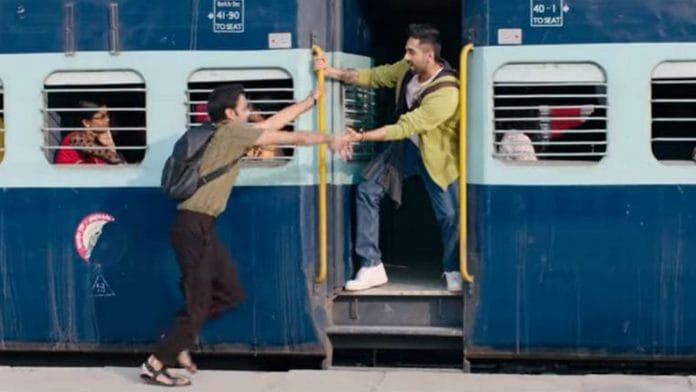“Vaise beta, yeh kab decide kiya ki ‘yeh’ banoge?” (“When did you decide you’d become ‘like this’?)
This is a question Manurishi Chaddha’s character, a bumbling, kind-hearted uncle, asks Ayushmann Khurrana. The latter replies, “Aapne kab decide kiya ki aap gay nahi banoge?” (When did you decide you’d not become gay?)
It is this kind of discourse that Hitesh Kewalya’s Shubh Mangal Zyada Saavdhan tries to tackle. The film, about a same-sex couple in small-town India coming out to their family, is the gay love story India desperately needed. Hilarious, heartwarming and irreverent, it hits all the right spots while trying to bust regressive mentalities.
Kartik (Khurrana) and Aman (Jitendra Kumar) love each other, but being out and proud in Delhi, despite running from homophobic goons, is easier than being out to one’s family in Allahabad. Aman’s father, Shankar Tripathi (played by Gajraj Rao) is a scientist with a practical approach to everything but his son’s sexual orientation. Shocked to their very core by Kartik and Aman’s revelation, the Tripathi family struggles to come to terms with the ‘disease’ and the implications it holds in society.
Shubh Mangal Zyada Saavdhan uses a light touch to explain the complicated situation that being gay in India is. The writing, by Kewalya, expertly weaves humour, some of it dark, into the most serious and dramatic situations. When Kartik is literally being beaten by Aman’s father, the scene is meant to be highly serious and representative of the kind of heinous behaviour the LGBTQ community faces in our country. But even there, Kewalya manages to make you smile and maintains that levity throughout.
Kartik is a slightly effeminate, proud gay man with no family to speak of. Aman is the traditional man from small-town India, who’s barely accepted himself. The coupling is deliberate — showing that a gay man isn’t the stereotype Bollywood has perpetuated for all these years. Small touches like this display a thoughtful sense of filmmaking. Kewalya relies on irony and juxtaposition to put his point across and explore the regressive mindsets that try and quash homosexuality. For example, the couple is found out during Aman’s sister’s wedding — a deeply traditional setting for something so unconventional. Aman’s father is a scientist, who is practical and methodical about most things in life and explains everything using scientific thought. But when it comes to his son’s homosexuality, he regresses, calling it ‘unnatural’ and something that goes against Indian culture.
Khurrana seems to have permanently settled into his brand of making small town-based films with a message of social awareness. He now seriously runs the risk of becoming boring. In this film, however, he manages to keep the audience on its toes, thanks to the writing. He also does not dominate the film, which is a welcome change. Kumar, a well-known face in web shows, delivers the goods as an awkward, frustrated gay man, torn between living his truth and making his parents happy.
However, the ones who take the biscuit are the parents — Rao, Neena Gupta, Chadda, and Sunita Rajwar. Their comic timing is unparalleled and is what keeps you rooted to your seat.
The punchy, fast-paced film touches upon different issues that openly gay men have to deal with, from the insensitive questions they are asked to the violence and brutality they face. But Kewalya is careful to not get into the nitty-gritties of homophobia, focusing more on the humour and the situational comedy. While this move is questionable (why not tackle the true horrors LGBTQ community faces on such a mainstream platform) there is an argument to be made for audience acceptance and taking smaller, lighter steps towards it.
Shubh Mangal Zyada Saavdhan is, in that sense, the perfect primer for mainstream Indian audiences outside of tier-1 cities. It speaks of homosexuality and Indian society in a way that will make any audience member just comfortable enough to start a conversation. And in 2020, it’s about time we had that conversation.
Also read: Bala’s bald patch is beautiful but its brown-faced hypocrisy can’t be ignored






